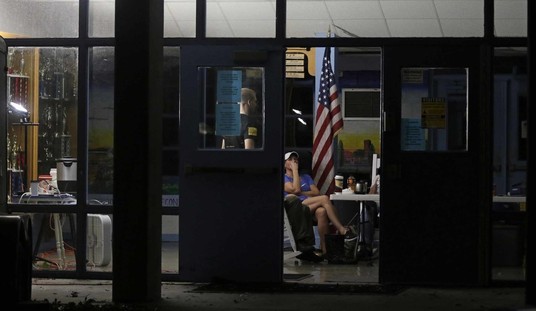Republicans in Congress and the Trump administration continue to try to identify and root out foreign influence. House Oversight Committee Chairman James Comer (R-KY) and Subcommittee on Delivering on Government Efficiency Chairwoman Marjorie Taylor Greene (R-GA) are thus seeking answers from Kari Lake, the senior advisor at the U.S. Agency for Global Media (USAGM), via a Tuesday letter shared exclusively with Townhall.
The USAGM, as Comer and Greene mention in their letter, is suffering from "longstanding security vulnerabilities exacerbated by mismanagement—a situation that persisted for years at the agency." The lawmakers, who cite numerous reports, specify that the Committee "has reason to believe that USAGM routinely and improperly utilized visa programs to employ poorly vetted foreign nationals, including from nations adverse to the United States. The Committee is also aware that USAGM officials abused their authority when awarding grants, including by awarding them to entities despite major conflicts of interest."
As the lawmakers later wrote in their letter, "The Committee seeks to make certain that in its new posture, USAGM, its networks, and grantees do not further abuse their authority and leave the agency and the country vulnerable to national security risks." They also stressed the urgency towards the end of the letter, writing that such concerns "must be urgently addressed to ensure that USAGM does not continue to pose national security risks and engage in improper or unethical behavior through its networks and grantees."
According to the USAGM, their mission is "to inform, engage and connect people around the world in support of freedom and democracy," but concerns exist that more is going on, about that more is going on, as the lawmakers reference "persistent abuses" in their letter to Lake.
From the last few years of then President Barack Obama's term, to the final months of President Donald Trump's first term, to now former President Joe Biden's term, as well as Trump's second term, reports on the subject abound.
Recommended
There's a report from the Office of Inspector General (OIG) from July 2020, as well as a report from the House Foreign Affairs Committee released last June. The OIG under Obama, in June 2015, also put out a report auditing Radio Free Asia's Expenditures. In March 2022, Rep. Scott Perry (R-PA), along with six other House members, wrote to the acting USAGM CEO at the time as well. Concerns were also addressed in The Heritage Foundation's "Mandate for Leadership: The Conservative Promise." In February 2021, just over a month after Biden's term, The Federalist put out an article to do with USAGM, "VOA Exec Fired For Reports Of Misconduct, Fraud, And False Credentials Quickly Rehired Under Biden."
The second Trump White House has also addressed USAGM. On March 14, the president signed an executive order, "CONTINUING THE REDUCTION OF THE FEDERAL BUREAUCRACY," which the lawmakers noted in their letter "eliminat[ed] the non-statutory components and functions of the USAGM."
Dan Robinson, described as "a 34-year veteran of Voice of America and its former White House correspondent," also raised concerns in an opinion piece from The Washington Times on November 27, 2024. "I have monitored the agency’s bureaucracy along with many of its reporters and concluded that it has essentially become a hubris-filled rogue operation often reflecting a leftist bias aligned with partisan national media. It has sought to avoid accountability for violations of journalistic standards and mismanagement," Robinson wrote, as the lawmakers referenced.
Almost immediately after the executive order, on March 15, the Trump White House also put out an article, "The Voice of Radical America."
Referencing coverage from The Federalist is not the only way in which Comer and Greene reference the Biden-Harris administration. Mentioning one of the OIG reports from the State Department and Heritage, Comer and Greene go into great detail explaining "security vulnerabilities," which is where the Biden-Harris administration comes in to lower protections [emphasis added]:
The U.S. Department of State Office of Inspector General (OIG) found security vulnerabilities at USAGM and determined that RFA leadership awarded insiders millions of dollars in grant funding. Reportedly, the Biden Administration reversed “long-overdue and necessary reforms, including security reforms” that the first Trump Administration implemented to address repeated requests “by the Office of Personnel Management (OPM) and the Office of the Director of National Intelligence (ODNI) that had been ignored by USAGM.” There are serious concerns that “USAGM is vulnerable to exploitation by foreign spies.”
The concerns continue from there, especially when it comes to what we don't know, and what the letter also references as being an issue thanks to USAGM vulnerabilities:
Evidence of this vulnerability is a disturbing finding that “over 1,500 USAGM personnel (nearly 40 percent of its total workforce) were performing their Tier 3 and Tier 5 national-security-sensitive positions with falsified and/or unauthorized suitability-for-employment determinations and with access to sensitive federal building and information systems.” Reportedly, “[i]n many cases, records (including Social Security numbers), were falsified or replaced with notional placeholders, and fingerprints (in many dozens of cases) were never submitted to the Federal Bureau of Investigation for basic background investigations.” Many of these individuals ultimately left USAGM and “rolled into other federal agencies with reciprocal clearance authorizations” while others “disappeared into U.S. society.” Today, the whereabouts and clearance status of these individuals is unknown.
Similarly, it appears that the locations of “foreign-based journalists in high-risk countries” are unknown to the USAGM—despite efforts to identify their locations “in the event they required rescue, extraction, or safe housing.” The locations are unknown due to willful ignorance by USAGM through what has been described as “the agency’s selective application” of its so-called “firewall.” In 2020, the firewall was implemented as a regulation in the Federal Register and nominally exists to protect journalistic independence. USAGM’s interpretation of the firewall notoriously shifted over time “depending on which Administration is in office and who is asking questions.” Even before enactment as a regulation, the firewall was reportedly used to “shirk legitimate oversight of everything from promoting adversaries’ propaganda to ignoring journalistic safety.”
Potential security vulnerabilities at USAGM extend to the abuse of U.S. visa programs for foreign nationals. Reportedly, “[r]ather than use the appropriate I visa intended for foreign journalists, USAGM uses the J-1 ‘cultural exchange’ visa to allow foreign nationals to transition easily into jobs that American citizens with cultural and linguistic expertise could satisfy.” Accordingly, “[t]he J-1 visa is intended for cultural and academic exchange programs, among others—none of which include journalism”and that “J-1 visas are meant for non-immigrant temporary exchanges.” Yet, reportedly, “[t]he USAGM’s J-1 visa holders often go on to apply for permanent residency, which violates the intention of this visa.” The misuse of the J-1 nonimmigrant visa program to bring in foreign nationals who actually have immigrant intent— compounded by improper vetting practices described above—raises serious concerns that the USAGM exposed the U.S. to security threats and even served as a conduit for foreign spies to infiltrate the U.S. government and obtain access to highly sensitive, even classified information.
Additionally, the OIG found what has been characterized as “waste and self-dealing, including security vulnerability and RFA leadership awarding insiders millions of dollars of grant funding...”
Comer and Greene are thus asking for a vast list of items to do with "National Security Risks," "Budget and Financial Records," "Location of Personnel," and "Conflicts of Interest and Other Potential Abuses."
Lake has been asked to turn over the requested information no later than July 1.
Check out my latest for @townhallcom, an exclusive letter to @KariLake in her capacity at USAGM from @GOPoversight chairman @RepJamesComer and @DOGECommittee chairwoman @mtgreenee!https://t.co/cnKkLaopHA pic.twitter.com/zD5tLzZriU
— Rebecca Downs🇺🇸🟦🇮🇱 (@RebeccaRoseGold) June 17, 2025
🚨 Chairman @RepJamesComer and @RepMTG are investigating how the U.S. Agency for Global Media (USAGM) hired poorly vetted foreign nationals and funneled grants through conflicts of interest.
— Oversight Committee (@GOPoversight) June 17, 2025
Foreign influence. Visa fraud. National security at risk. pic.twitter.com/XfVVkCLW0u
























Join the conversation as a VIP Member